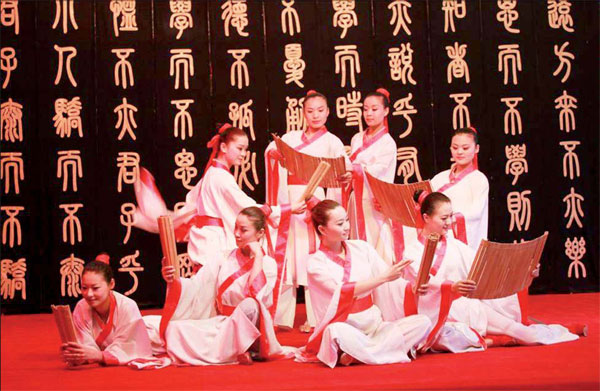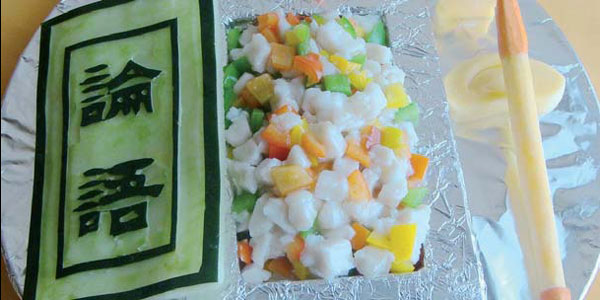One for all
Updated: 2013-06-14 08:00
By Ji Xiang (China Daily)
|
|||||||||||
|
Performers in a show at Qufu read Confucian mottos written on bamboo strips. |
|
A dish at the Kong Mansion feast with Confucian analects carved on cucumber. |
The theme of Confucianism runs through every aspect of Qufu's tourist industry
Qufu's travel industry has matured and developed over the years, but one slogan, promoted by the local government, has stood the test of time - the "six ones".
This refers to one ceremony, one feast, one lecture, one hotel theme, one in-depth experience and one practice. Six activities, but all connected to one central theme: Confucius.
One ceremony
At exactly 8 o'clock in the morning, outside the south gate of the Ming Dynasty city wall, a man hammers a bell and the city gate is slowly opened to a background of traditional music. This marks the beginning of the city gate opening ceremony.
Performers then begin a diverse array of performances dressed in fine costumes reminiscent of an ancient palace ball.
Following the performances tourists are encouraged to pass through the thick wall, under several gateways, before reaching the entrance of the Temple of Confucius.
Inside the temple, tourists take in the sights before gathering in front of Dacheng Hall for the final ceremony. The colossal Dacheng Hall is a reminder of the huge role Confucius plays in Chinese culture.
Now prayers begin, with costumed dancers paying tribute to Confucius first, followed by the tourists. The whole ceremony takes place amid an air of reverence and solemnity.
One feast
The Kong Mansion feast is renowned for its complicated rituals and strict procedures. There were traditionally two levels of feast, one prepared for emperors and ministers and the other served on ceremonial occasions.
The imperial feast was one of absolute opulence, the equivalent of a state banquet. It included 404 two-piece tableware sets, 196 courses and took 10 people four days to prepare. Courses would include parts of precious animals, including bear paws and monkey heads.
The feast now served to tourists is modified but based on the ancient one with some traditional food and table rituals.
It offers an opportunity for tourists to experience the strict structure of order and meaning associated with food in ancient China.
One lecture
Qufu is awash with lectures covering every aspect of Chinese culture from philosophy and history to archaeology, literature and linguistics.
The Spring and Autumn Lecture, organized by the Chinese Confucius Research Institute, is a platform for scholars to discuss areas of Chinese studies. Many in the audience are made up of professors and students.
The Poetry Hall inside the Temple of Confucius is another lecture venue. Where once emperors and ministers were lectured on Confucianism, today anyone can listen to a talk on Chinese culture.
The Confucianism Experience Base also hosts daily lectures on Chinese culture, catering mainly to summer camp students and large tour parties.
One practice
Tourists can practice many traditional Chinese arts in Qufu and through them experience the country's ancient culture.
There are numerous places to play the guqin, a seven-stringed instrument with a tranquil sound.
The traditional game Go is said to improve the imagination and sense of space. And calligraphy offers an insight into the development of Chinese characters.
Other activities on offer in the city include painting, dance, martial arts, archery, embroidery and classes in traditional Chinese medicine.
Hotel theme
Queli Hotel is among several hotels in Qufu with a Confucian theme.
Neighboring the temple and Mansion of Confucius, it is a traditional courtyard house with corridors connecting each room and an interior decorated with paintings, calligraphy and carvings connected to Confucianism.
The hotel also offers regular folk dance performances to entertain guests.
One in-depth experience
There may be no better place for a coming-of-age ceremony in China than at the Temple of Confucius. Students line up in front of Dacheng Hall dressed in traditional Chinese uniforms and swear an oath before reading lines from the Analects of Confucius. Then they pay their respects to Confucius, their parents and their teachers.
(China Daily European Weekly 06/14/2013 page24)
Today's Top News
List of approved GM food clarified
ID checks for express deliveries in Guangdong
Govt to expand elderly care
University asks freshmen to sign suicide disclaimer
Tibet gears up for new climbing season
Media asked to promote Sino-Indian ties
Shots fired at Washington Navy Yard
Minimum growth rate set at 7%
Hot Topics
Lunar probe , China growth forecasts, Emission rules get tougher, China seen through 'colored lens', International board,
Editor's Picks

|

|

|

|

|

|







